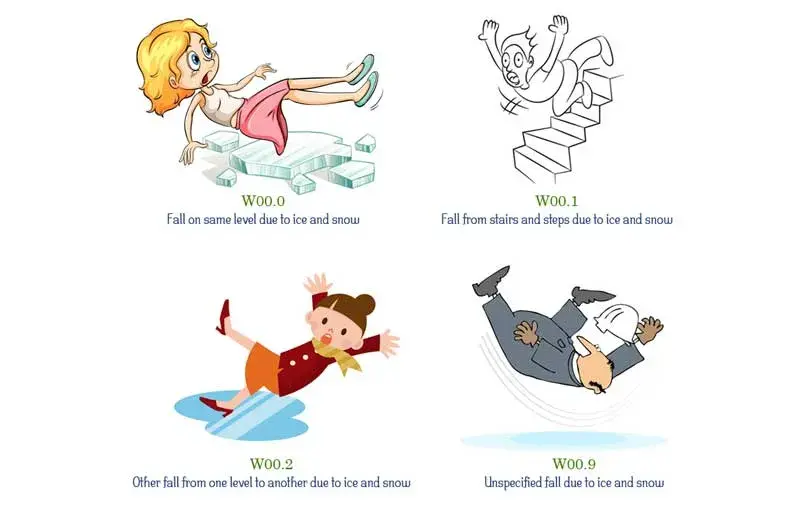As everybody celebrates the holidays, emergency departments and trauma centers are gearing up to treat festivity-related mishaps. Christmas and New Year are full of fun and cheer, but sadly, these are the times when the most accidents happen. Complaints attributable to festive activities include road traumas, drug and alcohol-related injuries, gastroenteritis, ski and snowboard accidents, and more. Our medical coding company wishes to alert physicians about brushing up their knowledge of ICD-10 codes to report various injuries and illnesses that tend to occur during the holiday season.
According to a recent Sioux City Journal report, the days and weeks leading up to and after Christmas, the brunt of mishaps treated by emergency room physicians include broken bones and bruises from falls on ice, cuts sustained while washing glasses and burns suffered while roasting the holiday ham.
Let’s look at weather-related accidents first. There are several ICD-10 codes to report falls due to ice and snow:
- W00.0 – Fall on same level due to ice and snow
- W00.1 – Fall from stairs and steps due to ice and snow
- W00.2 – Other fall from one level to another due to ice and snow
- W00.9 – Unspecified fall due to ice and snow
W00.1 covers all of the scrapes, cuts, and bruises that could appear due to a fall from ice or snow. All of the above codes require a seventh character to denote the encounter. For instance:
- W00.1XXA – Fall from stairs and steps due to ice and snow, initial encounter
W00.0XXA can be used to report collusion with another person such as sliding across the icy sidewalk into an innocent bystander.
Pedestrians can get hit by a nonmotor vehicle such as a bicycle. Report such accidents with V06.19:
- V06.19 – Pedestrian with other conveyance injured in collision with other nonmotor vehicle in traffic accident
V06.19 includes various circumstances, such as:- Pedestrian on ice-skates injured in collision with other nonmotor vehicle in traffic accident
- Pedestrian on sled injured in collision with other nonmotor vehicle in traffic accident
- Pedestrian on snowboard injured in collision with other nonmotor vehicle in traffic accident
- Pedestrian on snow-skis injured in collision with other nonmotor vehicle in traffic accident
For pedestrians on foot injured in collision with other nonmotor vehicle in nontraffic accident, use:
- V06.00XA – Pedestrian on foot injured in collision with other nonmotor vehicle in nontraffic accident, initial encounter
Winter is the time for skiing and sledding, and physicians could see adventurous folk reporting with various activity-related accidents. When coding the activity, it is important to know its type:
- Y93.23 – Activity, snow (alpine) (downhill) skiing, snow boarding, sledding, tobogganing, and snow tubing
- Y93.24 – Activity, cross country skiing
- V00.2115 –Fall from ice skates
- V98.3 –Accident involving a ski lift
ICD-10 codes useful to report injuries due to snowball fights include:
- T33.5 – Superficial frostbite of wrist and hand
- T.34.5 – Frostbite with tissue necrosis of wrist and hand
Medical Economics recently listed additional ICD-10 codes that physicians could be reporting during the holiday season:
- W14 – Fall from tree – useful to report a fall when decorating a Christmas tree
- R12 – Heartburn – Too much of fatty food and alcohol could trigger the condition
- Z72.820 – Sleep deprivation – Preparations could leave people deprived of sleep
- V80.1 – Injury as occupant of animal-drawn vehicle
- X08.8 – Burn by candle
- Z62.891 – Sibling rivalry – such as siblings squabbling over a toy
- Y93.D – Arts and crafts injury
- Y93.G – Cooking injury
- T75.4 – Electric shock – from stringing up lights that have bare wiring exposed
- F43.8 – Emotional stress
- W61.4 – Contact with turkey
- Y92.59 – Injury at shopping mall
Other common “Christmas” codes include:
- W11.XXXA – Fall on and from ladder, initial encounter
- F10.929 – Alcohol use, unspecified with intoxication, unspecified
- Y28.0XXS – Contact with sharp glass, undetermined intent, sequela
- S82 – Fracture of lower leg, including ankle
- S82.91XA – Unspecified fracture of right lower leg, initial encounter for closed fracture
Accidents can happen during the holiday, but people should take extra precautions to stay safe and healthy. Busy emergency physicians will attend to and treat patients based on how serious their condition is. Patients with trauma injuries from an accident and those with severe illnesses will take priority over more minor problems. For accurate coding of these conditions, emergency departments can always rely on experienced medical billing and coding companies.




